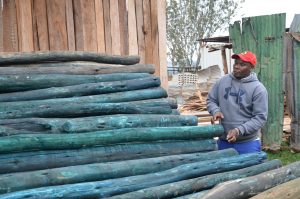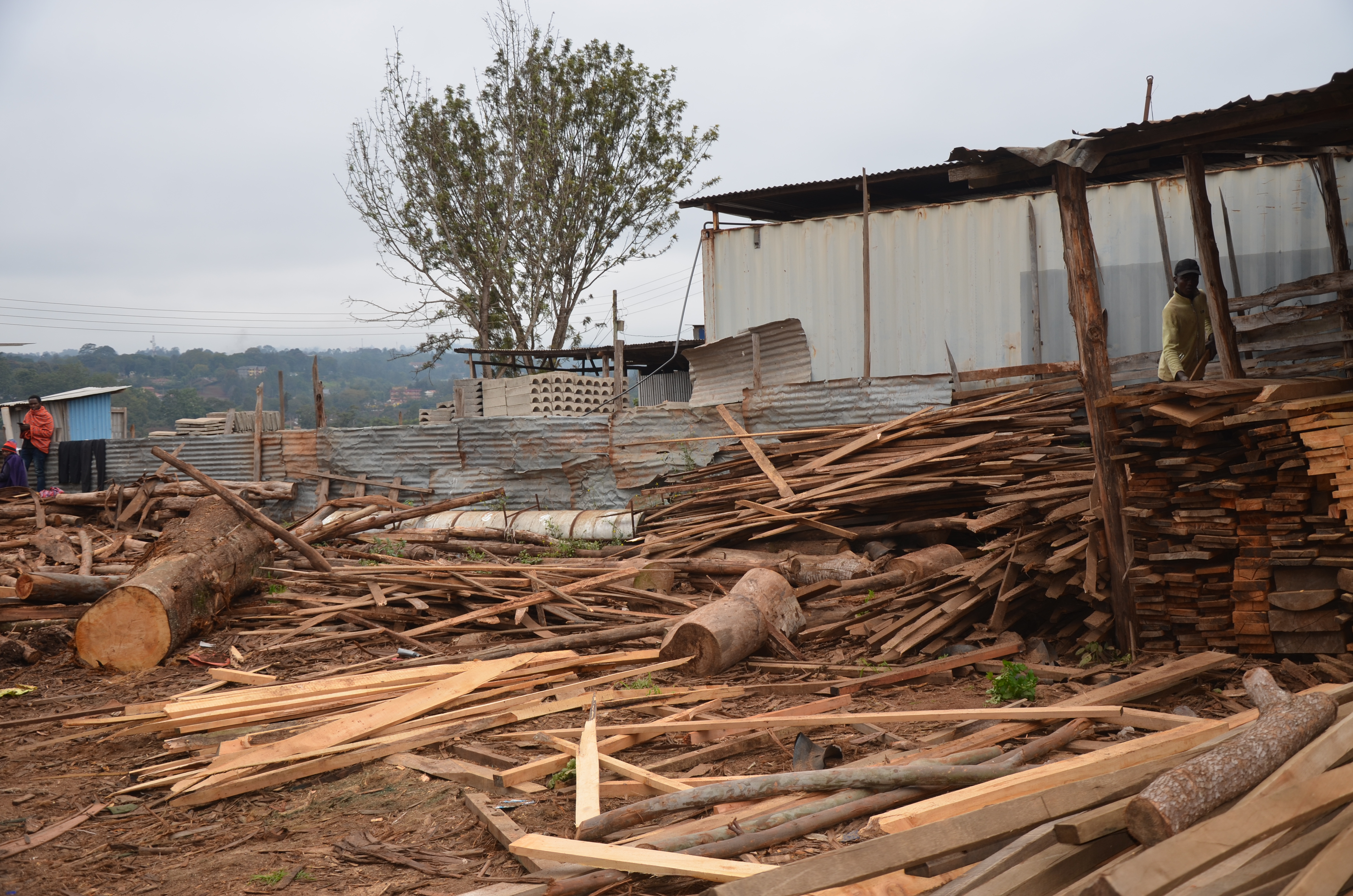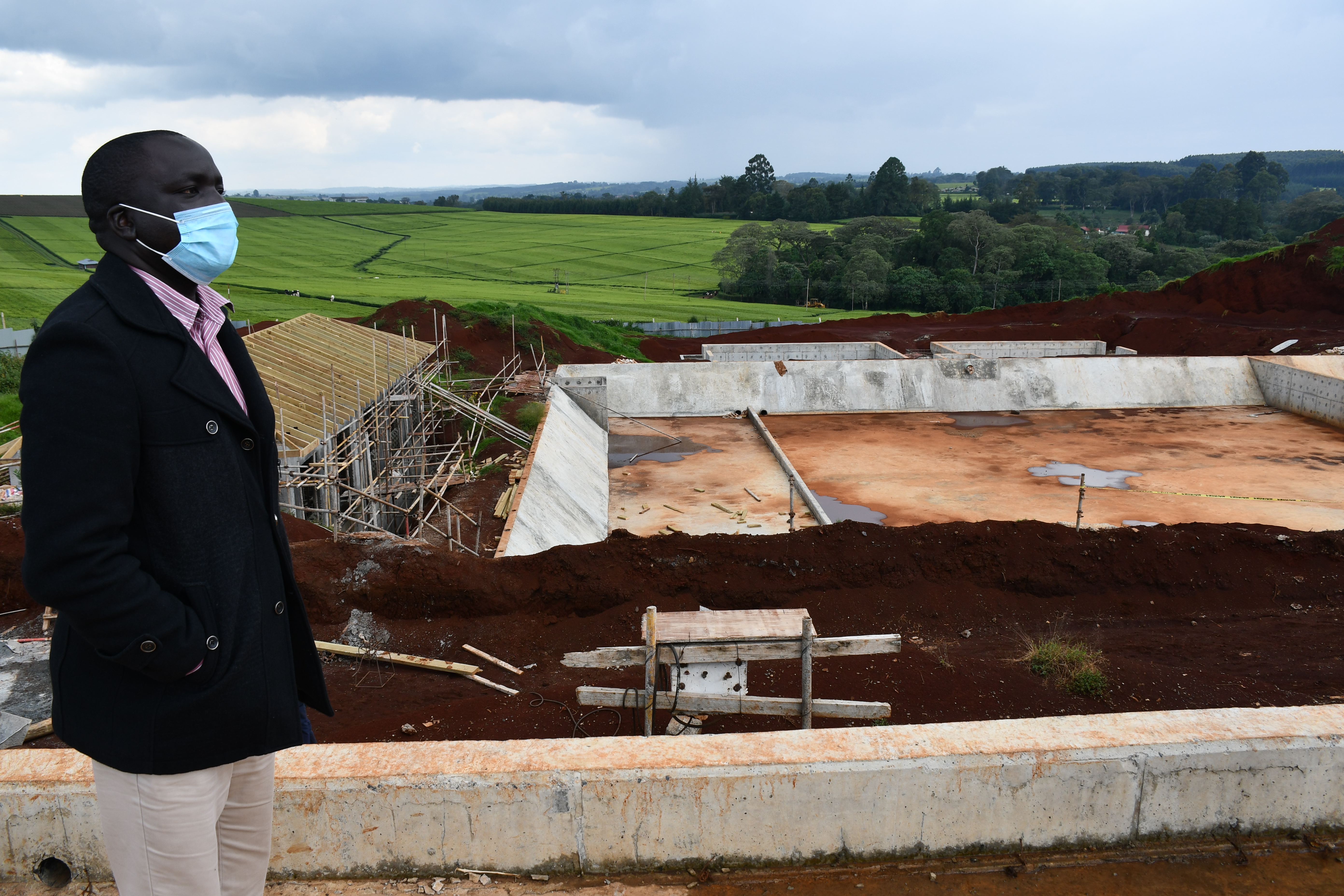Loggers and carpenters from Nyeri have lauded the State for the decision to lift a six-year ban on logging saying it had led to losses worth millions of shillings.
The lumbers said the move will now open up their businesses and help them rebuild their enterprises which got a severe beating from the Covid-19 pandemic lockdowns.
Mr. Joseph Irungu who runs Ebenezer Timber yard at King’ong’o area said prior to the ban, he had paid Sh600,000 as down payment to the Kenya Forest Service (KFS) to harvest mature trees in the Kabaru Forest situated in the Mount Kenya circuit.
Speaking to KNA at his yard, Irungu said he was eventually forced to suspend any further operation after the government outlawed logging its forest in 2018.
“I have suffered huge losses throughout the entire period the ban was in effect. Initially I used to employ up to 20 people in my yard but was later forced to relieve them of their duties since my business could no longer sustain them. I therefore welcome the government’s decision to lift this freeze since it will hand us a lifeline and enable us to get back to business,” he said.
Irungu said that the matter of a greenlight to harvest the trees he had paid for to KFS was still being handled in Nairobi. He, however, expressed hope that the process will soon be concluded to enable him to embark on harvesting the trees, a number of which have already rotted away.
“The Kenya Forest Service officers are yet to grant me the greenlight to get into the forest and harvest the trees I had paid for due to some few technicalities which are still being sorted. I am nevertheless optimistic that this process might be completed and hopefully by tomorrow I will receive the necessary document,” he said.
Paul Thumbi who operates three sawmills at Chaka and another at Ruiga is yet to recover from a Sh2 million loss he incurred after the government slapped the logging ban. At the time of announcement of the freeze, he only managed to leave the forest with his equipment as no one was allowed to ferry timber out of all the protected forests.
Thumbi who said he ventured into the logging business in 1968 admitted that he is yet to recover from the loss.
“I have been in the timber industry since 1968, but what we have gone through during this ban is to say the least unprecedented. Much of what I paid for was actually lost immediately after the ban came into effect. I left the forest with nothing despite having paid Sh3.5 million as legal fee to harvest timber. Today I am torn between suing the State and seeking compensation for the losses I have been forced to incur due to pronouncements beyond our powers,” lamented Thumbi.
He is nevertheless grateful after President Dr William Ruto announced the lifting of the freeze on logging but wants the government to come up with mitigation measures to ensure licenced millers are cushioned against future losses should a similar declaration be made.
Last month, a number of carpenters within Nyeri town lauded Ruto for lifting the ban on logging arguing that it will translate to more employment opportunities for residents besides helping in bringing down the cost of timber whose prices had threatened to drive them out of business.
They also believe the new directive will enable them access timber at a much cheaper price and in the process bring the cost of production for wood furniture down.
“We are hopeful that the price of blue gum timber, which is currently at Sh35 per foot, will go back to Sh22 before the ban. The price of mahogany is currently selling at Sh80 per foot and we also hope this can go down to at least to as low as Sh60 per feet. This way we shall be in a position to reduce the amount of money we charge our clients on our products,” said Joseph Macharia who runs a furniture yard at the Majengo area.
Anthony Gichuru who also operates a timber yard near Majengo said the lifting of the ban on logging is a big relief to them since they were on the verge of closing shop due to dwindling numbers of clients.
He lauded the State for reopening the forests to private loggers and said they also hope their suppliers will reciprocate the move by lowering the cost of timber to them.
“The lifting of the ban has come at a time when the number of our regular clients were going down by the day. We therefore hope to increase the number of our customers who place orders for beds by 20 per cent and those who place orders for tables by five per cent. This is because the two types of furniture are the most commonly bought by our clients,” he said.
On his part, Nyeri County Ecosystem Conservator Mr. Moses Wahome has dismissed claims by a section of media outlets and environmentalists for faulting the government for lifting the ban on logging insisting that some of the arguments are misleading to the public.
He clarified that only persons who had been issued with permits before the ban came into effect will be allowed to harvest wood from the forest and that no new permits will be issued until the current backlog is addressed.
“There have not been new allocations, the people who are going to the forest are the people who had materials shut in during the moratorium. When we start the allocations again, we have to have a definite number of millers depending on the available stock that can be sustainably cut down,” he has pointed out.
Wahome also dashed the hopes of compensation to the more than 100 saw millers in Nyeri who had lost their timber in the forest due to the ban insisting such a plan is not on the table at the moment.
“These saw millers are our stakeholders; they understand that whatever happened was beyond Kenya Forest Services that is why many are keen on coming back unconditionally. Many of them also want to maintain the longstanding working relationship they have had with KFS,” he stated.
According to the National Forest Resources Assessment Report the country’s forest cover stands at 8.83 per cent. Nyeri County has three times the nationally recommended 10 per cent forest cover and a tree cover of 45.17 per cent.

The State imposed a ban on logging on February 24 2018 which effectively restricted the extraction of timber from all public and community forests.
The moratorium was arrived at following the findings of a task force that had been constituted by the government to inquire into forest resource management and logging activities in the country.
The task force found out that the board and the management of KFS had been unable to “stem and in some instances have directly participated in, abated and systematised rampant corruption and abuse of office”in undertaking harvesting of forest products.
Forest plantations currently cover atleast 335,000 acres in all gazetted reserves of Kenya including the Mount Kenya, Aberdare, Mau Forest Complex, Cherangani Hills and Mt Elgon.
In 2019, saw millers across the country had raised concern over the ban on logging, saying trees worth billions of shillings were rotting in the government forests and in the process denying Treasury at least Sh30 billion annually in lost revenue.
According to the 2020 Economic Survey Report, the total public forest cover rose from 141,600 hectares in 2018 to 147,600 hectares in 2019 as a result of the ban on logging.
Kenya had hoped to attain its target of 10 percent forest cover by this year according to projections by the Kenya National Bureau of Statistics released in 2020, a feat that remains elusive.
By Samuel Maina and Wangari Mwangi




